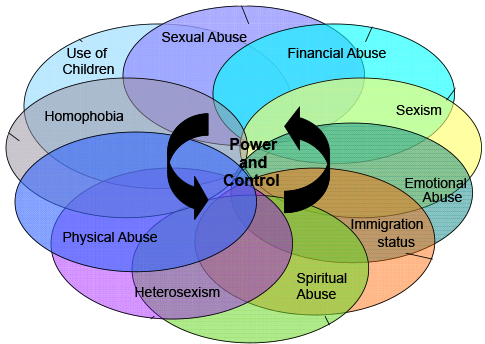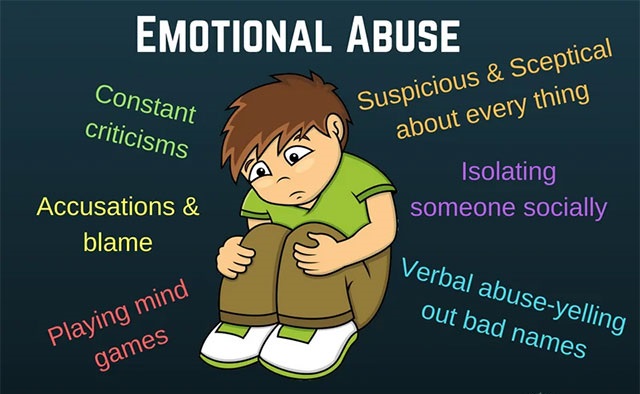Emotional abuse is a form of violence that can leave the victim feeling helpless and hopeless. It’s important to understand how emotional abuse works, what it looks like, and how it differs from other types of abuse. In this post, we’ll discuss the different types of emotional abuse. Also, its risk factors for both children and adults with disabilities or chronic illnesses. We will also suggest ways to stop emotional abuse from happening in the first place!
Contents
- 1 Understanding Emotional Abuse
- 2 Emotional Abuse In Intimate Relationships
- 3 Emotional Abuse In Workplace
- 4 Emotional Abuse Among Children
- 5 Emotional Abuse In Disability
- 6 Emotional Abuse In Mental Illnesses
- 7 Experts On Emotional Abuse
- 8 Talking About Emotional Abuse
- 9 Talking To A Professional
- 10 Conclusion
- 11 A Word From Therapy Mantra
Understanding Emotional Abuse

Emotional abuse is a type of violence that can leave the victim feeling helpless and hopeless. Emotional abuse can take many different forms. But it always involves the use of words or actions to control, intimidate, or humiliate the victim. Unlike other types of abuse, emotional abuse often occurs in private, making it difficult for victims to identify and report. The profile of an abuser may include a person who is/:
- Considered by others to be a “control freak”.
- Hypersensitive and takes offense easily.
- Has low self-esteem, or poor self-concept. And, this may lead the abuser to put down the victim to make themselves feel better.
- With rigid beliefs who is intolerant of any deviation from their values.
- Excessively jealous and suspicious.
- Volatile and has mood swings which can include explosive anger outbursts.
Why Emotional Abuse Is Difficult To Identify?
Emotional abuse is often difficult to identify because it doesn’t leave any physical marks. However, over time, emotional abuse can take a toll on the victim’s mental health and well-being. Emotional abuse can also lead to other types of violence, such as physical abuse or sexual abuse.
Types of Emotional Abuse

There are many different types of emotional abuse. The following list includes some common examples:
- Verbal aggression: Name-calling, insults, threats
- Isolating: Restricting access to family and friends or preventing them from participating in activities outside the home
- Intimidating: Making threatening gestures or faces; causing fear by demanding extreme obedience
- Disrespecting: Refusing to acknowledge the victim’s feelings or needs; making fun of them
- Manipulative: Using guilt, shame, or fear to control the victim
Other types of emotional abuse include:
- Making someone feel guilty or ashamed
- Speaking to them in a way that is humiliating, condescending, patronizing, or demeaning
- Humiliating their family members (or children) in front of others
- Manipulating the victim into thinking they are crazy or stupid and making fun of mental illness if it applies
- Sabotaging their efforts to improve themselves
- Forcing them to dress or act a certain way
- Making false accusations against them, then discrediting the victim if they try to defend themselves
- Accusing others of abuse shifts attention away from what is happening with the abuser (e.g., accusing someone else of abusing the victim)
Degrees Of Emotional Abuse
There are three degrees of emotional abuse:
Low-level abuse: This type of emotional abuse is mild and may not even be noticed by the victim. It includes name-calling, insults, and verbal threats.
Moderate abuse: This type of emotional abuse is more severe. Thus, it can cause significant psychological damage to the victim. It includes physical violence, sexual abuse, and emotional blackmail.
Severe abuse: This type of emotional abuse is the most severe. As a result, it can result in long-term psychological damage or even death. It includes torture, imprisonment, and forced prostitution.
Risk Factors of Emotional Abuse
Both children and adults with disabilities or chronic illnesses are at risk for such abuse. Some common risk factors include:
- Having a disability or chronic illness
- Living in a family that is struggling financially
- Having parents who are abusing drugs or alcohol
- Being raised by a single parent
- Having parents who are emotionally abusive themselves
- Living in a household with domestic violence
- Having a mental illness or disability
- Being a member of a marginalized group (e.g., LGBTQ+ people, immigrants, people of color)
- Experiencing childhood abuse or neglect
- Having an insecure attachment style
- Working in a high-stress occupation
Devastating Consequences Of Emotional Abuse
This abuse can have serious consequences for victims, including:
- Mental health conditions (e.g., depression, post-traumatic stress disorder)
- Chronic pain and illnesses
- Physical disabilities or problems with daily activities
- Substance abuse and addiction
- Problems at work or school
- Long-term relationship problems
- Unintended pregnancy or STI exposure
- Suicidal thoughts and behaviors
Emotional Abuse In Intimate Relationships
Intimate relationships (e.g., romantic, sexual, and familial relationships) are common sites of emotional abuse. Both men and women can be emotionally abusive to their partners. However, studies indicate that rates of male-to-female physical intimate partner violence are much higher than female-to-male physical intimate partner violence. Similarly, there are far more reports of female-to-male psychological intimate partner violence than male-to-female psychological intimate partner violence. The following list includes some common examples of such abuse in an intimate relationship:
- Name-calling or insulting
- Threatening to end the relationship if the victim does not comply with demands
- Keeping constant tabs on where the victim goes and who they’re with
- Monopolizing the victim’s time and energy, especially in a way that prevents them from engaging in activities outside of the relationship
- Forbidding or preventing the victim from seeing family members or friends
- Using guilt to coerce compliance (e.g., saying things like “If you loved me…”)
- Making fun of the victim’s physical appearance, interests, or accomplishments
- Intimidating the victim with gestures or facial expressions
- Sexual assault or coercion
Risk Factors Of Emotional Abuse In Intimate Relationships

Several risk factors increase the likelihood of emotional abuse in an intimate relationship. Some of these include:
- Having a history of being physically or emotionally abused as a child
- Witnessing domestic violence between one’s parents
- Having low self-esteem or feeling insecure about oneself
- Feeling desperate to keep the relationship together
- Believing that you are responsible for helping your partner deal with his or her emotions
- Having a mental illness, such as depression
- Being socially isolated and lacking support from others in the community (e.g., family members, friends)
NOTE: Being emotionally abused can cause long-term psychological damage to victims. If you believe that you are being emotionally abused by your partner, it is important to get support from other people in the community. This might include friends and family members who can provide emotional support. Also, you consider options for leaving or seeking help to end the abuse.
Talking With Your Partner About Emotional Abuse
Keeping things inside will not make them go away. Especially if your partner is emotionally abusive. Nevertheless, talking with your partner about the abuse can be intimidating. But it might also help him or her realize that he/she has a problem. And they need to get support for it. Some things you can do include:
- Trusting people in your life who are likely to listen without judgment
- Talking to someone outside of your relationship, such as a friend or family member
- Seeking support from community organizations (e.g., victim’s services) that can provide counseling and other resources
- You can with your partner about how the abuse makes you feel. And what you want to see happen next in the relationship
Asking for help is not easy. Especially if you have been emotionally abused for a long time. But it can be the first step to ending the abuse. And then building a healthier, happier life that you deserve!
NOTE: If you are a victim of this kind of abuse, please know that you are not alone. As there is help available. Remember, you deserve to be happy and safe in your relationships. And never forget that you can get there with the right support. Please don’t hesitate to reach out for help.
Emotional Abuse In Workplace
Emotional abuse in the workplace is a kind of power harassment. It can be also:
- an expression of authority,
- unfair treatment by managers or colleagues,
- and lack of professional growth opportunities for employees in the same position.
For example, supervisors may hold back information from subordinates to manipulate them into taking actions that benefit the supervisor but not the employee. In some cases, emotional abuse may be subtle, such as a co-worker who regularly interrupts or dismisses the opinions of others in meetings.
Some signs that someone is being emotionally abused in the workplace include:
- Having a feeling of dread about going to work
- Feeling isolated or alone at work
- Being belittled or humiliated in front of others
- Regularly receiving unfair criticism
- Experiencing mood swings for no apparent reason
- Suffering from physical symptoms such as headaches, stomach problems, and chest pain
NOTE: Supervisors and managers are in positions of power and have a duty to use that power responsibly. When they engage in emotional abuse it can seriously harm their employees both mentally and physically.
Risk Factors Of Emotional Abuse In The Workplace
Several factors can make employees more likely to experience emotional abuse at work. These include:
- Having a personality or physical trait that makes you different from your co-workers
- Being highly competent, skilled, and capable of doing your job well
- Being new to the organization and therefore having less power than those who have been there for a longer time
- Having a family or personal situation that requires you to work long hours or take on extra work responsibilities outside of your job
- Working in a high-stress environment where the pressure to achieve is intense
Tips For Preventing Emotional Abuse At Work
There are several things that employees can do to protect themselves from emotional abuse in the workplace. These include:
- Being aware of your strengths, weaknesses, and personality traits
- Building a network of trusted co-workers who can support you when you need help or have questions
- Setting clear boundaries with supervisors so they know what is acceptable and not acceptable behavior toward you at work
NOTE: If you are experiencing emotional abuse in the workplace, speak to a trusted colleague or manager about your situation. If that doesn’t resolve the problem, report it to human resources (HR). Also, keep records of any incidents and save emails or other forms of communication between yourself and anyone else involved.
Emotional Abuse Among Children

Children are also at risk for such abuse. Some common examples of such abuse among children include:
- Being constantly criticized or ridiculed, especially in front of others
- Being isolated from family and friends
- Having parents who excessively check up on them, follow their movements, or interrogate them about whom they are with
- Name-calling or humiliating a child in public or private settings (e.g., making fun of a child’s physical appearance)
Risk Factors Of Emotional Abuse Among Children

Several risk factors increase the likelihood of such abuse among children. Some of these include:
- Having parents with mental health problems, such as depression
- Witnessing domestic violence between one’s parents or other adults in the household (e.g., step-parents)
- Being exposed to physical abuse of a brother sibling sister, which can cause children to feel powerless and that they are not safe in their own home
- Living in a home where there is substance abuse
- Being neglected (e.g., not being hugged, kissed, or told that you are loved)
- Having parents who are constantly fighting or arguing
- Suffering from a disability may make it difficult for children to communicate their experiences of abuse
Actions Steps To End Emotional Abuse
If you are a child who is experiencing such abuse, there are steps that you can take to try and end the abuse. Some things you can do include:
- Telling someone that you trust what is happening in your home (e.g., family member, friend, teacher)
- Seeking support from community organizations or programs specifically for children who are experiencing family violence
- Seeking support from your school counselor or social worker
- Talking with a parent about the physical, mental, and emotional abuse that you are facing at home
- Reporting the abuse to law enforcement if it is serious enough (e.g., life-threatening)
Emotional Abuse In Disability
People with disabilities are also at risk for such abuse. Some common examples of emotional abuse among people with disabilities include:
- Being ignored or treated like a child
- Having others speak for them without their consent
- Being denied participation in decisions that affect their lives
- Being ridiculed, insulted, or made fun of because of their disability
- Having their disability used as an excuse to not provide necessary services or accommodations
- Being threatened with institutionalization or abandonment
Risk Factors Of Emotional Abuse In Disability
Several risk factors increase the likelihood of such abuse among people with disabilities. Some of these include:
- Having a communication disorder, which can make it difficult to express what is happening
- Having a cognitive disability, which can make it difficult to understand or remember the abuse
- Being dependent on others for assistance with everyday activities, making them more vulnerable to exploitation
- Suffering from a mental illness, such as depression or schizophrenia
- Living in a long-term care facility where staff are not adequately trained to deal with emotional abuse
Actions Steps To End Emotional Abuse In Disability
If you are a person with a disability who is experiencing such abuse, there are steps that you can take to try and end the abuse. Some things you can do include:
- Telling someone that you trust what is happening in your life (e.g., family member, friend)
- Seeking support from community organizations or programs specifically for people with disabilities who are experiencing family violence
- Reporting the abuse to law enforcement if it is serious enough (e.g., life-threatening)
Emotional Abuse In Mental Illnesses
People who suffer from mental illnesses are also at risk for emotional abuse. Some common examples of emotional abuse among people with mental illnesses include:
- Being ignored or treated like a child
- Having others speak for them without their consent
- Denial of participation in decisions that affect their lives
- Being ridiculed, insulted, or made fun of because of their mental illness
- Facing threats or being threatened with institutionalization or abandonment
Risk Factors Of Emotional Abuse In Mental Illnesses
Several risk factors increase the likelihood of emotional abuse among people who suffer from mental illnesses. Some of these include:
- Having a communication disorder, which can make it difficult to express what is happening
- Having a cognitive disability, which can make it difficult to understand or remember the abuse
- Being dependent on others for assistance with everyday activities, making them more vulnerable to exploitation
- Living in an environment where there is a lack of social support and encouragement from family members
Actions Steps To End Emotional Abuse In Mental Illnesses
If you are a person with mental illness who is experiencing emotional abuse, there are steps that you can take to try and end the abuse. Some things you can do include:
- Telling someone that you trust what is happening in your life (e.g., family member, friend)
- Seeking support from community organizations or programs specifically for people with mental illnesses who are experiencing family violence
- Reporting the abuse to law enforcement if it is serious enough (e.g., life-threatening)
Experts On Emotional Abuse
There are several experts on such abuse who are willing to help you. Some examples of these include:
- Law enforcement officers, who can take reports and provide information about how the abuse is defined under the law in your area
- Social workers or social service providers, who may be able to offer support for both emotional abuse victims as well as abusers (if they are seeking services)
- Therapists or counselors, who can provide support and counseling for victims of emotional abuse
- Doctors or nurses, who can offer referrals to mental health professionals or other resources in your community
Case Study
A case study on emotional abuse and intimate relationships:
An emotionally abused woman (who we will call “Sue”) is married to a man who calls her names, makes fun of her appearance. He tells people she isn’t smart enough for him or their son. He would refuse to let anyone visit the house when he’s home because they might see that she’s “not good enough”. Not only this, he has even hit her in the past. Sue feels like she can’t leave because she doesn’t want her son to grow up without a father. But she also fears what he might do if she tries to leave.
The Key Message: This is an example of emotional abuse within an intimate relationship that mostly goes undocumented or unidentified otherwise.
Talking About Emotional Abuse
Victims and survivors of emotional abuse need to know that they’re not alone. However, it can be difficult to talk about such abuse. Especially if you’re not sure how to describe what happened.
To begin with, you can start by using the language that feels most comfortable for you. For example: “I felt hurt when he said those things”. And then take it from there! In this way, there are many ways to talk about emotional abuse. And you get to choose how much or little information is right for you! Here are some ideas:
- In a person with friends, family members, support groups, etc.
- Online in blogs like this one or forums
NOTE: If something is triggering for you while reading this article, feel free to skip over the content or come back to it at a later time.
A Few Things To Remember
If you are experiencing emotional abuse, there are several things that you can do to try and end the abuse. Some steps you can take include:
- Get help from a trusted loved one (e.g., professional, family member)
- Document the abuse (e.g., keep a journal of the incidents, take pictures)
- Seek out medical attention for injuries
- Get legal help
- Develop safety plans to prepare in case of an emergency
- Leave if possible
Talking To A Professional

If you feel like you are in danger, or the abuse is too much for you to handle on your own, it is important to talk to a professional. Some professionals that can help include:
- Law enforcement officers
- Social workers or social service providers
- Therapists or counselors
- Doctors or nurses
NOTE: You can also call 911 if you are in immediate danger.
Conclusion
Emotional abuse can happen to anyone, even though it may be more common among certain groups of people. So, if you are experiencing emotional abuse or think that someone else is being emotionally abused. Then there are steps that you can take to end the abuse. Some professionals are willing to help with this problem as well. Since it can have devastating consequences, it is important to get help if you are experiencing it.
A Word From Therapy Mantra
Your mental health — Your psychological, emotional, and social well-being — has an impact on every aspect of your life. Positive mental health essentially allows you to effectively deal with life’s everyday challenges.
At TherapyMantra, we have a team of therapists who provide affordable online therapy to assist you with issues such as depression, anxiety, stress, workplace Issues, addiction, relationship, OCD, LGBTQ, and PTSD. You can book a free therapy or download our free Android or iOS app.


